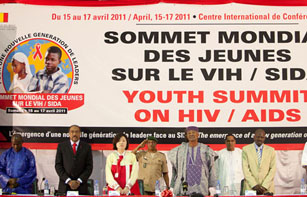
Feature Story
Young people convene in Mali to revolutionize the AIDS response
15 April 2011
15 April 2011 15 April 2011
UNAIDS Executive Director Michel Sidibé (second from the left) and President of the Republic of Mali, Amadou Toumani Touré (fourth from left) at the opening of the Youth Summit in Bamako, Mali. 15 April 2011.
Credit: Kris Krug
Thirty years into the response to HIV, an estimated 3000 young people are newly infected with HIV everyday. Many young people living with HIV still do not have access to treatment and only 34% of all young people have correct and comprehensive knowledge about HIV and how to protect themselves.
That is why more than 150 young HIV activists from across the world have gathered for a three day summit in Bamako, Mali, to rally a youth-led response on HIV in lead up to the United Nations General Assembly High Level Meeting on AIDS taking place in New York from 8 to 10 June 2011.
Convened under the patronage of the President of the Republic of Mali, Amadou Toumani Touré, and co-hosted by UNAIDS, the summit provides a forum for young people to explore and commit to innovative ways to mobilize young people in the AIDS response.
“I am ready to take the call to action coming out of the Mali Youth Summit on HIV to the High Level Meeting at the UN. Young people must take the leadership of the AIDS response, and they must be given the space to lead,” said President Touré.
You are the most powerful engine we have for transformation and progress. Do not let anyone tell you that you are the leaders of tomorrow. You are the leaders of today
UNAIDS Executive Director Michel Sidibé
Speaking at the opening of the summit, UNAIDS Executive Director Michel Sidibé urged young leaders to claim their space in the AIDS movement: “You are the most powerful engine we have for transformation and progress. Do not let anyone tell you that you are the leaders of tomorrow. You are the leaders of today.”
A Call for Action to articulate the vision of the youth movement is being developed by the delegates. It will be launched online at the closing of the summit, marking the start of an intensive period of online and offline social mobilization to get endorsement of the declaration by young people all around the world.

Participants at the Youth Summit on HIV.
Bamako, Mali. 15 April 2011. Credit: AFP
"We now feel that it is time for us to reclaim our future using every energy and power. We call on world leaders to respond to the Call for Action that will come out of this summit, but we also call on young people everywhere to mobilize for the AIDS response," Marie Tamoifi Nkom, steering committee member of the Mali Youth Summit on HIV from Cameroon.
While youth organizations and networks focusing on HIV are increasingly mobilized in the response, young people continue to face difficulties in accessing and influencing decision-makers and are not equal partners. Therefore, the Summit will also serve to link and strengthen existing youth networks across different regions and deepen their connections with the AIDS community.
Young people are still at risk of HIV, with about 40% of all new HIV infections among adults occurring among young people aged 15-24. Young women are particularly vulnerable, accounting for 64% of new infections among young people worldwide.



